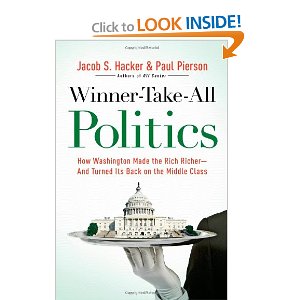
Paul Pierson and Jacob S. Hacker
5.0 out of 5 stars Political Economy
January 17, 2011
Retired Reader (New Mexico) – See all my reviews
This book is an effort by two political scientist to explain how in the last thirty years or so wealth in the U.S. has become concentrated in the hands of a smaller and smaller number of people. The fact that this has occurred is indisputable. So is the fact that the gap between the richest Americans and everybody else has grown exponentially just as the U.S. middle class is gradually disappearing. The explanation of why this has occurred offered by Hacker and Pierson is rather more controversial.
They begin by noting that over the last thirty years not only have the already rich gotten much richer, but that the U.S. National Economy has been transformed into a system that no longer serves the interests of the once broad and thriving American Middle Class that once was the backbone of that economy. In their view the system now serves the interests of a small minority of the rich and very rich (one to five per cent of the population). So their book begins by asking how and why did this occur and why over the last thirty years?
Since Hacker and Pierson are political scientists not economists, they argue that this transformation was due to political, not economic factors. Using what appears to be accurate statistical data they cite three `clues' or factors that point to what happened to the U.S. economy: 1) hyper-concentration of wealth; 2) sustained hyper-concentration; and 3) during the thirty years under study, while wealth concentrated at the very top of the income scale, the economy essentially stopped working for the middle and working classes who continually lost ground during this period.
This economic transformation in favor of the rich they argue is not the result of impersonal economic forces but of deliberate government actions or at times inaction (drift). Their central thesis is that mostly incremental government policies over the last thirty years have had the cumulative effect of changing the U.S. economic system into a `winner take all' system heavily biased in favor of the rich and very rich. At the same time federal government policies undermined the traditionally strong labor unions that served as a counter weight to corporations' power and systematically deregulated financial markets and executive compensation.
Of course the other phenomenon that they observed is that as wealth becomes more and more concentrated, the influence of the wealthy on all aspects of the political process becomes more and more pronounced. This is evidenced by the fact that politicians ignore the bulk of their constituents in favor of the views of a small number of their wealthiest backers. They note Plutarch's comment that “An imbalance between rich and poor is the oldest and most fatal ailment of all republics.” They also note that the reason the Democrats and Republicans, rhetorical differences aside, essentially support the same policies is because both are now beholden to the super wealthy. Not by conspiracy, but more or less by accident the U.S. in the 21st Century has become an oligarchy in which a very small number of very rich people control the powers of government over the increasingly disadvantaged majority.
So how accurate is this account of how the U.S. is becoming a nation of the privileged few controlling the destiny of the majority? Well they make a pretty good case for it and their argument that this state affairs is due to political not economic factors is quite plausible.

From Publishers Weekly
Perhaps you haven't heard: over the last 30 years the middle class has shriveled while the wealthy enjoy the skewed economics of the gilded age. The authors do their best to blow the dust off of their subject by taking a close look at this political “30 year war” and carefully parsing its roots. Corporate coalitions, lobbying, tax policies geared to the wealthy, and the extreme use of the “rule of 60” filibuster have tipped the scales and ultimately heaped blame onto the majority party. While Government can affect the distribution of wealth, it doesn't catch up with economic realities in time, and a changing Washington blocks attempts at reform. Where moderates used to rule the swing vote, now radical conservatives have taken hold. Unions are powerless, public interest groups prevail, and Christian conservatives drag Republicans ever right. Meanwhile, voters remain poorly informed. Though they never shed the sheen of “old news,” Hacker and Pierson end on a note of optimism: the middle class can take the majority again with a “politics of renewal” shepherded in on a wave of “mass engagement” and “elite leadership.”



